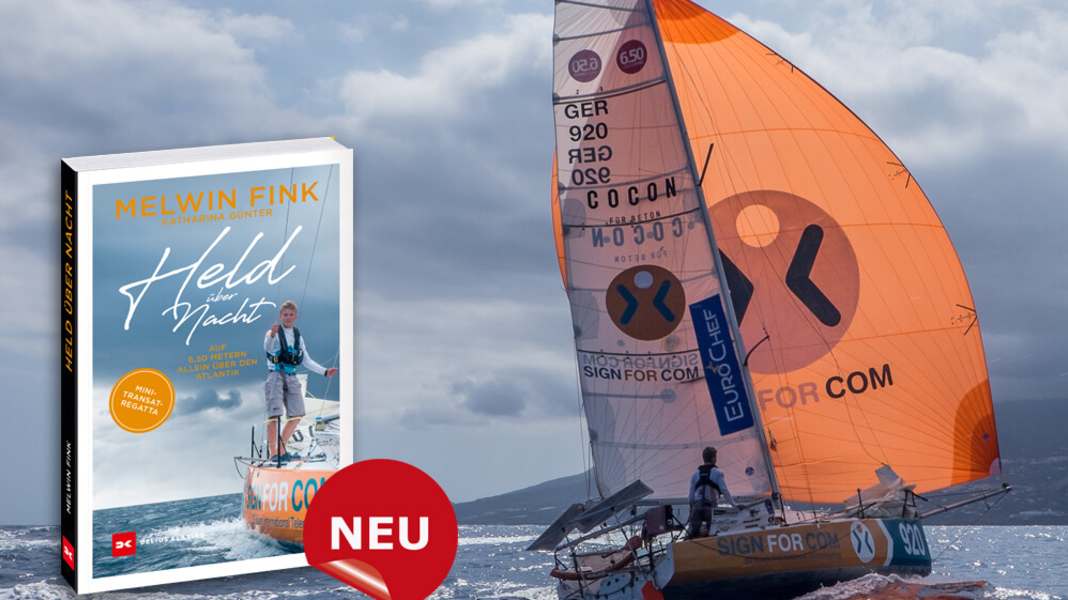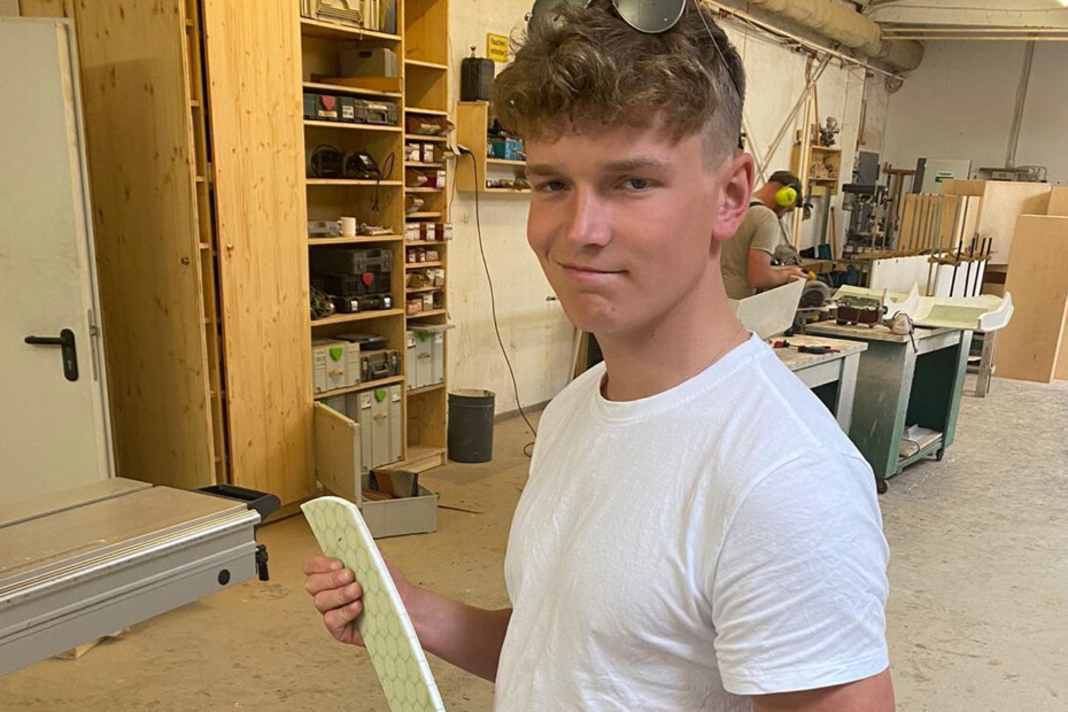
The whole adventure can now be read in his book "Held über Nacht". In "Held über Nacht", Melwin Fink tells the exciting, inspiring and captivating story of his dream to take part in the mini-transat, how he got there and what he experienced along the way.
But there was a setback. In April 2022, during a crossing from Barcelona to Palma de Mallorca with his new Vector mini "KarinMonika", named after the first names of his grandmothers, the celebrated mini-transat third with his sailing friend Marc Menzebach unexpectedly encountered an endurance test of a completely different kind. Around 30 nautical miles north of Palma, the mast of his boat breaks twice: once about a metre above deck, then again in the upper third. The rig bends sideways. The two sailors have no choice but to immediately cut away the rig and the mainsail - whereupon the Mini moves like a wild cork in the swell. It is immediately clear that the crew has no chance of reaching a harbour under their own power in the given conditions without an engine.
Parts of this second boat, which is not the one with which he sailed the mini-transat, which unfortunately could not be saved, were cut to size in Lasse Lietz's wood workshop in Bielefeld and signed exclusively by Melwin Fink for our competition.
Competition
Are you a fan of Melwin or the Mini-Transat and want to find out all about his experience at the regatta? Then we have the right competition for you.
We are giving away ten sets, each consisting of a book "Held über Nacht" and a signed original piece of the hull of the "KarinMonika", as well as five signed copies of his book.






The competition ended on 4 July 2022 and the draw was held without recourse to the courts. The winners will be notified by email.
The story in a nutshell
The Mini-Transat is a single-handed regatta that has been held every two years since 1977, covering around 4,000 nautical miles across the Atlantic and is contested on 6.5 metre boats.
Young sailing enthusiast Melwin Fink decides early on to take part in this regatta and pulls out all the stops to make it happen. You need sponsors for a race like this, especially if you are a 16-year-old schoolboy and the money in your account is limited, as the entry fees for the preparatory regattas, your own boat and what you need to live on quickly add up to several hundred thousand euros. But that can't stop Melwin, so he researches diligently and draws up a cost overview, which ends up totalling 230,000 euros, with around 100,000 euros for the boat alone. With his application folder, he sets off on his search. After many rejections, rejections and setbacks, he manages to find almost 55 sponsors who support him and make his dream possible.
His goal is to compete in the Mini-Transat in October 2021, and in December 2019 he will become the owner of his new and race-ready Pogo 3, which will be his closest companion for the next two years: the "Signforcom". His dream is taking shape, and four preparatory races later, the Mini-Transat lies ahead of him.
On Monday, 27 September 2021, the time has come. The adventure for which he has been preparing for almost three years begins with the starting signal. Melwin gets off to a bumpy start and ends up at the back of the field. The disappointment is great, this is not how he had imagined it. Then the situation changes. A storm front with 40 knots is announced over the radio and the first reports of boats that have already suffered damage start to trickle in. Gusts of up to 48 knots hit his boat and he hopes that the rig and hull can withstand the strain. The ocean around him is raging. The poor weather conditions, which are a problem for many participants, have put him in the middle of the field.
The storm continues to intensify on 2 October. This time, wind speeds of up to 50 knots and a wave height of five metres are expected. The race organisers recommend that participants seek a harbour in good time, even if the race is not interrupted and there will be no restart.
In the remaining time, Melwin repeatedly checks the facts, his position and repeatedly calculates the expected zone in which he will find himself in the storm. According to his calculations, he will only reach wind speeds of around 30 knots, so he decides to sail on. At this point, he is in about 14th place.
Shortly before the storm front, his thoughts swirl around in his head once again. Has he thought of everything? Is he well prepared? How strong will the wind really be? Can his boat withstand it? After careful consideration, he makes the decision: Sail on! Off into the storm.
He realises that what lies ahead of him during the night will not be easy. But after all, it is an ocean race at the highest level. He will sail this leg to the end!
The wind is now reaching gusts of 40 knots and more. The swell gets steeper and steeper and starts to break over his boat. The crests of the waves keep crashing into his cockpit. In addition, heavy rain begins to fall, severely restricting visibility.
"Meanwhile, a deep, oppressive darkness lies over me. I can see neither the moon nor the stars. It's just me, the boat and the storm. I have the deepest respect for this front. It's no longer about sailing fast, but solely about surviving this storm."
When the position reports come in on the world receiver in the afternoon of the next day, Melwin can't believe it. He is in first place, the runner-up is over 100 nautical miles away and the main field is even 200 nautical miles away. He slowly realises that he was probably the only one who didn't head for a safe harbour. Everyone else has played it safe. The fact that the stage finish "La Palma" is only about 300 nautical miles away gives him another big boost of motivation. He crossed the finish line first after 1,350 nautical miles to much cheering and applause on 7 October at 16:05 - he was the winner of the leg.
But it's not all positive reactions. On land, he was also criticised and accused of acting selfishly and sailing recklessly into a storm. He had taken too great a risk. The attention for the young sailor and his decision is huge.
The second stage is not as exciting as the first. As the last night dawns, Melwin no longer believes that he can achieve another good position. He tackles the last seven nautical miles at 25 knots and heads for the finish line with his heart pounding and full of adrenaline.
After travelling a total of over 4,000 nautical miles on his "Signforcom", he finishes the second leg in 22nd place. In the overall standings, however, he made it to third place. Nobody had expected this result.
As a 19-year-old German in third place in the series classification, this has only been achieved by two Germans in the prototype classification in the 44-year history of the Mini-Transat.

